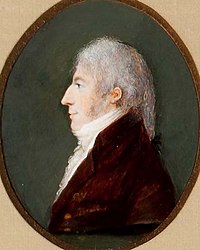|
Charles-Joseph, 4th Duke d'Ursel
Charles-Joseph, 4th Duke d'Ursel and of Hoboken, Prince of Arches and Charleville and Count of Grobbendoncq (9 August 1777 – 27 September 1860) was a statesman and minister in the United Kingdom of the Netherlands and later Belgium.[1] FamilyCharles-Joseph was born as Count d´Ursel was the son of Wolfgang-William, 3rd Duke d'Ursel and Flore Princess of Arenberg, a sister of Louis Engelbert, 6th Duke of Arenberg. He married Josephine-Ferrero Fieschi, Princess of Masseran. When his father died in 1804, he became the 4th Duke of Ursel and 4th Duke of Hoboken. His sister Louise-Marie married to the Count of Lannoy and is one of the ancestors of Stephanie, Hereditary Grand Duchess of Luxembourg. ChildrenToday all living cadet branches of the current house of Ursel can be linked to him, there are currently 7 cadet branches in the family, most of them founded by his son Ludovic.[2] Charles-Joseph, 4th Duke d'Ursel
CareerIn 1810 he was mayor of Brussels, in 1814 and 1815, commissioner-general for internal affairs in the provisional government in the southern Netherlands a position he also held from 1815 to 1819 under King William I. Minister of Works and Public Works. Years later, after the Belgian independence, he was a member of the Senate for the Province of Antwerp (1839–1847) and for the District of Mechelen (1847–1859).[1] He became a first class member of the Royal Institute of the Netherlands in 1818. This was changed to first class supernumerair' associate in 1841. He joined the successor institute, the Royal Netherlands Academy of Arts and Sciences as foreign member in 1851.[3] During the Battle of WaterlooThe Duke and his wife were invited to attend the Duchess of Richmond's ball. After the battle had taken place, Brussels was flooded with thousands of wounded officers and men. The Duke invited several Dutch officers to stay at his residence to recover; Captain Veeren, commander of the Light Company of the Dutch 2nd Line Battalion, who was severely wounded leading his company in the attack on La Haye Sainte, wrote his wife two days after the battle: "I thought I would come here in the evening with the intention of going to hospital, but there came to me a gentleman, a Duc (or Duke) d'Ursel, and he insisted that I'd stay with him, but having Van Houten [his 1st Lieutenant, red.] with me, I let him know I would have him stay with me; to which he immediately complied, and we are being very well cared for."[4] The officers remained in the residence of the Duke until they recovered or were transported back to Holland. Ancestry
See alsoReferences
|
|||||||||||||||||||||||||||||||||||||||||||||||||||||||||||||||||||||||||||||||||||||||||||||||||||||||||||||||||||||||||||||||||||||||||||||||||||||||||||||||||||||||||||||||||||||||||||||||||||||||||||||||||||||||||||||||||||||||||||||||||||||||||||||||||||||||||||||||||||||||||||||||||||||||||||||||||||||||
